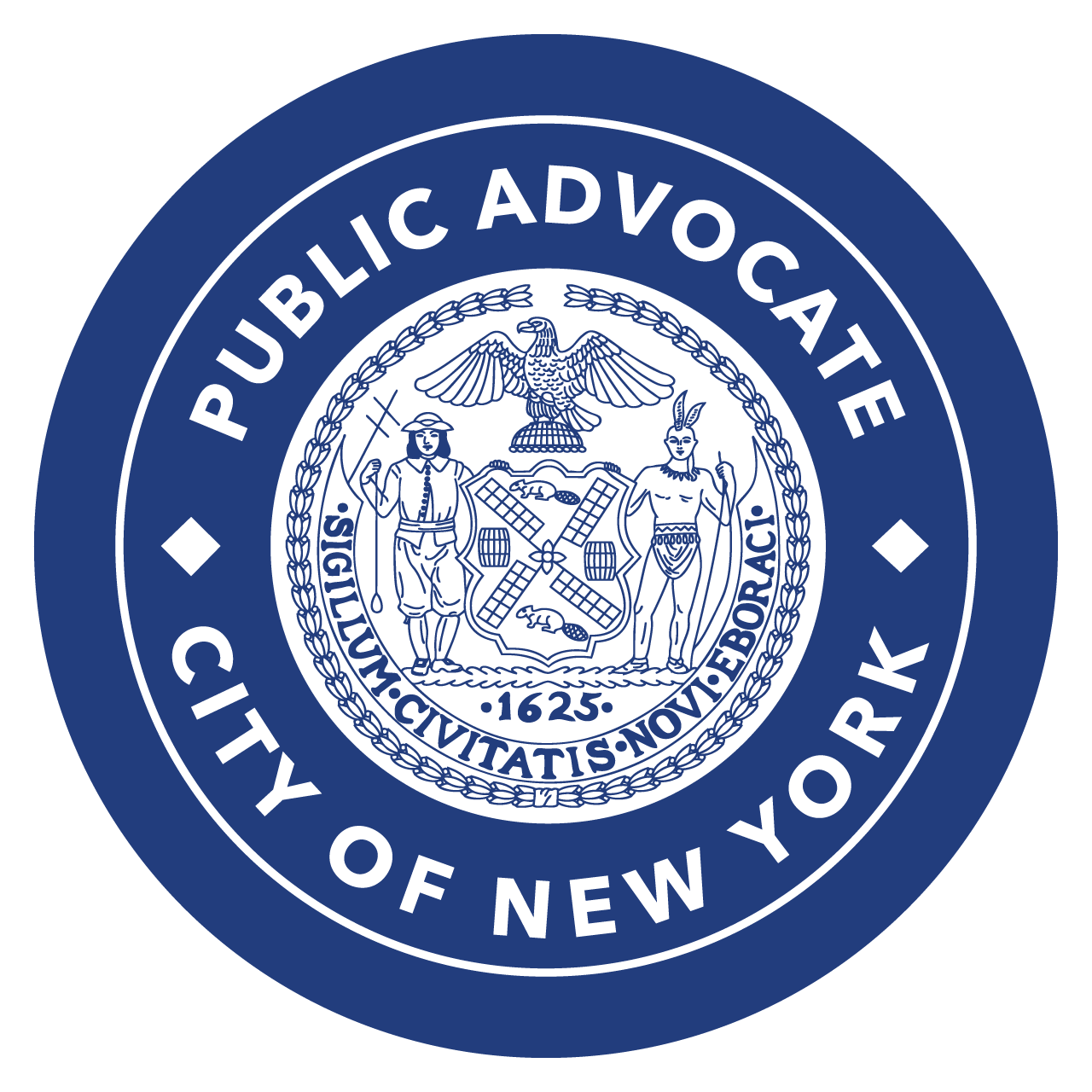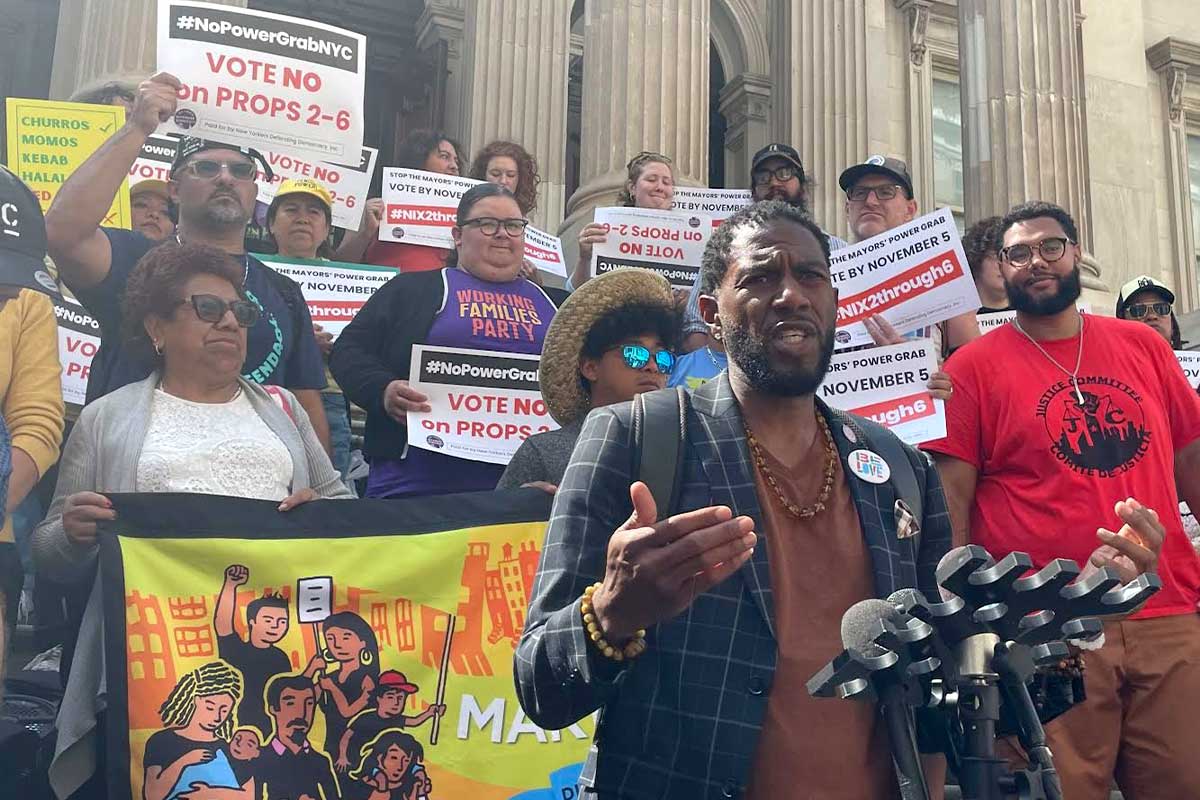
Explore Open Positions at the Office of the Public Advocate
Join Our TeamLatest
Press
December 9th, 2024Press Release
NYC Council and Public Advocate File Joint Lawsuit in State Court to Invalidate Mayor’s Emergency Orders Declaring Passage of Law a State of Emergency to Suspend Ban on Solitary Confinement
Today, the New York City Council and Public Advocate filed a joint lawsuit with the Supreme Court of the State of New York seeking to invalidate Mayor Adams’ emergency executive orders that suspended parts of Local Law 42 of 2024, which bans solitary confinement in city jails. The Article 78 legal filing argues that Mayor Adams’ issuance of Emergency Executive Orders 624 and 625, which declared a state of emergency in city jails because of the imminent effective date of the law in order to suspend portions of it, was unlawful, unprecedented, and an undemocratic abuse of his authority that no previous New York City mayor has ever attempted. One day before Local Law 42 went into effect, Mayor Adams signed the emergency orders, making the historically unparalleled claim that a law going into effect represented an emergency even though state law governing emergency powers does not provide justification for such a use. Since the initial issuance of the orders, the mayor has extended the emergency declaration every 30 days and his order suspending the law every five days.
“Despite his desperate power grabs, this mayor can't just ignore the laws he doesn't like,” said Public Advocate Jumaane D. Williams, sponsor of Introduction 549-A/Local Law 42 of 204. “Ending the harmful isolation of solitary is a moral and legal imperative, yet the administration is desperately trying to maintain a status quo on Rikers that is dangerous to people on both sides of the bars. I am proud to partner with the Speaker to ensure that the mayor can't continue abusing the declaration of a 'state of emergency' to preserve his ego or political goals. We can't simply pardon or excuse this mayor's attempt to emulate the worst impulses of Donald Trump at the expense of New Yorkers, and I urge the court to end his false emergency so we can address the real crisis.”
“The democratic process of lawmaking cannot justifiably be declared a state of emergency, and Mayor Adams’ emergency orders are an unlawful and unprecedented abuse of power,” said Speaker Adrienne Adams. “The City Council overrode the Mayor’s veto to ban solitary confinement in city jails because its use has been proven to cause physical, psychological, and emotional harm and makes our city and jails less safe. Mayor Adams’ decision to exceed his legal authority, simply because he was overruled, undermines the foundation of our democracy, and it must be invalidated. This lawsuit is aimed at ensuring mayoral abuse of democratic government cannot stand, and the human rights and safety crisis on Rikers caused by maintaining the status quo of failed policies and practices is discontinued.”
“Emergency Executive Orders are not tools for any Mayor to misuse in undermining laws passed by the City Council,” said Council Member Sandy Nurse, Chair of the Committee on Criminal Justice. “Local Law 42 was enacted to save lives and reduce violence in our city jails, reflecting the will of the Council and the people we serve. Mayor Adams’ actions demonstrate a troubling disregard for our democratic process, the City Charter, and his duty to protect New Yorkers. This lawsuit is unfortunate, but a necessary step to hold him accountable for this unprecedented overreach of power.”
The Council and Public Advocate’s legal filings can be found here: Petition Memorandum of Law
The lawsuit requests that Mayor Adams’ emergency orders be found “arbitrary, capricious and contrary to law, the issuance of which is beyond [his] lawful authority,” and vacated.
Several organizations intend to file amicus briefs, including The Bronx Defenders in conjunction with Brooklyn Defender Services, Neighborhood Defender Service of Harlem, New York County Defender Services, and Queens Defenders; the #HALTsolitary Campaign and Jails Action Coalition, and the New York Civil Liberties Union.
"Mayor Adam’s brazen suspension of this law is not only undemocratic and unlawful, but it sends an unmistakable message to the people we represent that their lives do not matter to this administration," said Meghna Philip, Interim Director of the Impact Litigation Practice at The Bronx Defenders. "The passage of LL42 represented a rare moment in which incarcerated New Yorkers testified publicly about the horrors they experience on Rikers Island, and our democratic system responded. The Mayor's executive orders silence those New Yorkers' voices, and the violent, torturous practices this law bans, including solitary confinement, continue on Rikers Island. We commend the City Council and the Public Advocate for standing up for the people we defend, and the courts should step in to end this abuse of executive authority by the Mayor."
“We applaud the City Council, the Speaker, the Public Advocate, and our fellow amici for today’s lawsuit challenging the Mayor’s illegal executive orders and demanding DOC implement Local Law 42,” said Anisah Sabur, the #HALTsolitary Campaign and the Jails Action Coalition. “Confinement is torture. It causes immense suffering, devastating harm, and death. It also worsens safety for everyone. After more than a 12 year campaign and robust, deliberative democratic process, a supermajority of the City Council overrode the Mayor’s veto to enact Local Law 42. This law will end solitary and instead use alternatives proven to reduce violence and better protect people’s health. The Mayor can not usurp the Council’s legislative authority and all of our public participation in the democratic process by issuing illegal executive orders to continue DOC’s torture regime. It is finally time for the Mayor and DOC to follow the law, stop torture, improve safety, and save lives by ending solitary once and for all.”
“Solitary confinement is an abuse of human rights,” said Lori Zeno, Executive Director of Queens Defenders. “We stand in solidarity with the New York City Council, Council Speaker Adams, and Public Advocate Williams in their momentous lawsuit challenging the Mayor’s illegal executive orders and demand the implementation of Local Law 42 to finally end solitary confinement. The time has come for the City of New York to end this abhorrent abuse and we urge the court to prioritize the health and safety of people in DOC custody.”
“For years, the inhumane restrictive housing practices in New York City jails have inflicted immense physical and mental trauma on incarcerated New Yorkers,” said Lucas Marquez, Director of Civil Rights and Law Reform at Brooklyn Defenders. “On behalf of the countless solitary survivors and those that have lost their lives at Rikers, the City Council passed Local Law 42 to end the torture of solitary confinement. Yet the administration has flouted LL42, failing to implement the law’s safeguards and due process protections. DOC continues to impose the draconian practice, from ‘deadlocking’ to cages-within-cells, on people in its custody. We cannot allow these abuses to continue and urge the court to take action to stop this torture.”
Excerpt from the Memorandum of Law:
“During the 180-day period in which the Administration was given time to implement the law, the Mayor did not take any discernable steps to implement the law. Instead, the Mayor signaled that he would seek judicial relief from Chief Judge Laura Swain, the federal judge presiding over Nunez v. City of New York, a constitutional challenge to conditions of confinement at Rikers Island. DOC informed Chief Judge Swain that they believed Local Law 42 conflicted with court orders she had issued in that case requiring, among other things, a court-appointed monitor’s approval of certain security measures (Nunez Doc. No. 724). Arguing that Local Law 42 was federally preempted by Chief Judge Swain’s orders, DOC told the chief judge in a June 2024 letter that they planned to file a motion asking her to issue ‘an Order suspending the requirements of Local Law 42’ (id.). In response, the Council prepared for a court battle over the proper scope of the monitor’s authority and whether Local Law 42 was truly preempted by federal court orders. To that end, the Council passed a resolution authorizing the Speaker to ‘engage in legal action on behalf of the Council to defend Local Law 42.’
“But Mayor Adams and DOC never filed their promised motion with Chief Judge Swain. Instead, the Mayor took matters into his own hands: he suspended Local Law 42 himself. In doing so, he became the first mayor in our City’s history to issue an emergency order to prevent the implementation of a local law that passed over his veto.”
Excerpt from the Memorandum of Law:
“An overridden veto is not an emergency. “Emergency powers may only be exercised in the face of “disaster, rioting, catastrophe, or similar public emergency.” Exec. L. § 24(1). But when Mayor Adams declared a state of emergency and suspended Local Law 42, he identified no imminent emergency that required a swift, unilateral response. Instead, the purported “emergency” was the impending “effective date of Local Law 42” and the supposed “risks” posed by the purposeful implementation of that local law (EEO 624 at 7). But neither of those things constitute a “disaster, rioting, catastrophe, or similar public emergency,” as a matter of law. Exec. L. § 24(1). Because this core threshold requirement of the Executive Law has not been met, the Mayor’s declaration of emergency and accompanying suspension of Local Law 42 are illegal and invalid.
“Neither the passage of a local law nor the consequences anticipated by the law’s opponents constitute a “disaster, rioting, catastrophe, or similar public emergency” under the Executive Law. The text, structure and purpose of the Executive Law compel this conclusion for a variety of reasons.
“First, courts have found that the Executive Law gives mayors the power to engage in “prompt and immediate unilateral action” when there is no time for “a deliberative body such as a [local] legislature” to respond. Prospect v. Cohalan, 109 A.D.2d 210, 217-18 (2d Dep’t 1985) (citing Exec. L. §§ 24(1), 25, 26, 29-b), aff’d, 65 N.Y.2d 867 (1985). Indeed, the mayor’s broad but temporary emergency powers are necessary because “emergency situations” require “prompt and immediate unilateral action … to preserve and protect life and property.” Id. If prompt and immediate unilateral action is not necessary, and the situation can instead be addressed by a legislative body, then it is not a “disaster” or “emergency” for the purposes of the Executive Law. See id. For that reason alone, deliberative legislative action and its immediate consequences are not a “disaster” or “emergency” sufficient to enable emergency executive measures, as a matter of law.
“Second, the plain text of the Executive Law confirms that duly-enacted legislation and its purported consequences are not a “disaster” or “emergency” under the statute. The Executive Law mandates that a mayor’s emergency suspension of a local law must be “reasonably necessary to the disaster effort.” Exec. L. § 24(1)(g)(ii). This requirement—and, in particular, the phrase “disaster effort”—makes no sense if the supposed “disaster” is the enactment of a local law. A local law is not a “disaster effort”; it is something that must be done via the democratic lawmaking process. Simply put, the Executive Law’s clear requirement that any suspension of a local law be “reasonably necessary to the disaster effort” cannot be squared with the Mayor’s unprecedented position that the passage of a local law may itself constitute a disaster.
“Third, the Executive Law’s detailed definition of “disaster” does not, by its plain text, include the passage of a local law or the law’s purported implementation risks. Exec. L. § 20(2)(a) (defining “disaster”). The statutory definition includes a long list of illustrative examples of events that count as “disasters.” Id. That list consists entirely of disease outbreaks, weather and climate-related disasters (e.g., floods and hurricanes), other natural disasters (e.g., earthquakes), and a narrow set of man-made disasters such as malicious attacks and accidents that result in immediate, true emergencies: terrorism, cyber events, explosions, radiological accidents, bridge failure or collapse, and nuclear, chemical, biological, or bacteriological releases. Exec. L. § 20(2)(a).
“None of the statute’s examples even remotely resemble the enactment and implementation of a local law over a mayor’s veto. That’s because the State Legislature did not intend for mayors to be able to declare that the passage of a duly-enacted local law constitutes an emergency. For that reason, the definition of disaster cannot be reasonably read to apply…”
Excerpt from the Memorandum of Law:
“Mayor Adams’ emergency orders violate the Executive Law in at least four separate ways. First, the Mayor’s unilateral suspension of Local Law 42 was not premised on any “disaster, rioting, catastrophe, or similar public emergency” as those terms are defined by the Executive Law. Exec. L. §§ 20, 24(1). Second, there is no rational basis for the Mayor’s finding that public safety is imperiled by the law going into effect. Exec. L. §§ 20, 24(1). Third, the Mayor failed to meet the multiple enumerated requirements for the suspension of a local law, including that any suspension provide for the “minimum deviation” from the requirements of the local law. Exec. L. § 24(1)(g)(v). Fourth, an overbroad interpretation of the Executive Law that enables these sorts of emergency orders runs headlong into both the intent of the Executive Law and the City Charter’s separation of powers.
“Any one of these four failings, standing alone, renders the Mayor’s emergency orders unlawful and invalid.”
“And left in place, the Mayor’s illegal suspension of Local Law 42 sets a dangerous precedent for future mayors to abuse their emergency powers when they are dissatisfied with the outcome of lawful democratic processes and have lost a policy debate.”
Excerpt from the Memorandum of Law:
“If these bedrock principles are taken seriously, it is impossible to interpret the Executive Law to enable a mayor to do what Mayor Adams has done here: to declare that the passage of local law constitutes an “emergency” necessitating the unilateral suspension of that very law. Allowing these executive orders to stand would amount to endorsing a mayoral “super-veto” over any local laws that touch on issues of public safety.”
Excerpt from the Petition:
“This Article 78 petition seeks judicial intervention and an order finding that these two emergency orders are outside the scope of the Mayor’s authority and an abuse of his emergency powers. No other mayor in the City’s history has ever used these emergency powers as an end-run around a local law, and a finding otherwise—that the Mayor can override a super-majority of Council members—would set a dangerous precedent. In our system of government, there is a balance of powers between the legislature that makes laws and the executive who executes them. Council members, and their votes, represent the will of the people. The Mayor cannot disregard a local law just because he disagrees with the Council’s well-deliberated policy choices.”
“The Mayor’s emergency orders declare a state of emergency and then extensively re-write Local Law 42 by suspending, modifying, or replacing nearly all of the policy choices embodied in the law’s text. Those policy choices of Local Law 42 address acute harms suffered by incarcerated people and their loved ones, and these choices were enacted through the democratic lawmaking process following a hard-fought policy battle between the Council and Mayor. In the place of the policy choices that prevailed at the conclusion of that policy debate, the Mayor’s emergency orders substitute his own policy preferences and priorities—the very ones that the Council rejected when it overrode his veto by a vote of 42 to 9.”
Background: In December 2023, the Council voted to pass Int. 549-A and ban solitary confinement in city jails. The bill descended from a previous version (Int. 2173) introduced by the Council in December 2020, which was the subject of a hearing that year. Int. 549 was introduced in June 2022, received a hearing in September 2022, and was the subject of deliberations with stakeholders and revisions over the course of more than another year. Among those revisions was a 120-day extension of the law’s effective date to allow more time for its implementation. Following its passage, the mayor vetoed the bill in January 2024, and the Council voted to override his veto by a vote of 42-9.
Solitary isolation, even only for a few days, leads to significantly heightened risk of death by accident, suicide, violence, overdose, and other causes. Research shows that people placed in solitary confinement are over seven times more likely to self-harm and six times more likely to commit fatal self-harm. Solitary confinement has also been shown to induce acute anxiety, depression, psychosis, and other impairments which may seriously reduce one’s capacity to reintegrate upon release. In New York City, these disastrous effects are felt almost exclusively by Black and Latino New Yorkers, who make up over 90% of all people in city jails. Since 2022, 33 people have died on Rikers. Though Mayor Adams has repeatedly claimed solitary confinement does not exist in city jails, a Columbia University Center for Justice report - Solitary by Many Other Names – outlined its continued use.

Get Help!
The Office of the Public Advocate assists with complaints and inquiries involving government-related services and regulations. From resolving housing complaints to combating abuse by agencies, the Office helps thousands of New Yorkers annually by improving transparency and accountability of City government.


